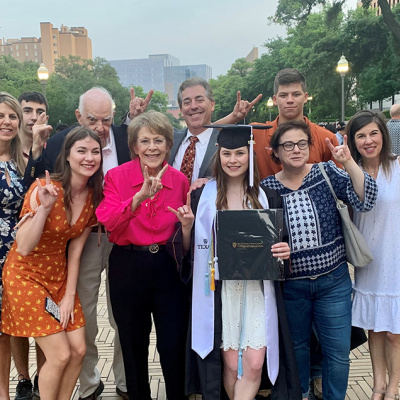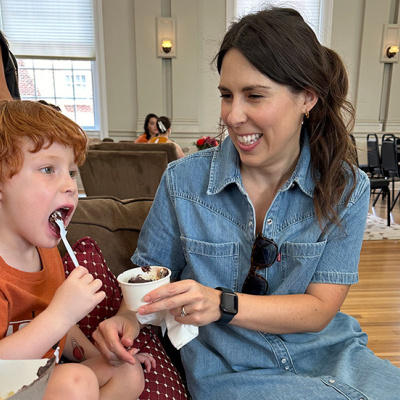Former Vice President Joe Biden Speaks at LBJ Library

On Tuesday at 6 p.m., a full house eagerly awaited the arrival of Joe Biden, the 47th vice president of the United States. But about 20 minutes later, Larry Temple, LBJ Foundation Chairman, came out to announce that due to delays, Biden’s plane had not yet landed. In the meantime, guests would be treated to a “twofer” in the form of a surprise appearance by UT Chancellor Bill McRaven.
McRaven gave the audience a geopolitical rundown, tackling hefty subjects like ISIS, the North Korean nuclear threat, and the state of the U.S. military. He recalled the raid he commanded on Osama bin Laden’s compound in Abbottabad, discussed his now-immortal “make your bed” UT commencement speech, and spoke highly of the former vice president: “Biden is gregarious and outgoing. [He] remembered who you were,”McRaven said before adding that the Obama-Biden duo was highly unique. “You saw not only a partnership, but a friendship.”
As the crowd took to their feet to give McRaven a standing ovation, they unwittingly found themselves welcoming the night’s main act, who had casually sauntered out. Biden embraced McRaven, the two shared a few private words, and both scurried offstage so that planned remarks could be delivered to formally welcome Biden.
Biden was on campus as the LBJ Presidential Library’s fifth annual Tom Johnson lecturer, part of a speaker series offered to the UT student body and general public free of charge. Weeks before, tickets were distributed to a line of hundreds outside the library, and hours before the event, a standby section snaked around the basement of the LBJ building. By the time Biden arrived, the LBJ auditorium was filled to the brim and crews had their cameras trained on center stage.
Biden teed off by paying tribute to McRaven, calling the admiral a “man of enormous capacity and judgment.” Former LBJ Library Director Mark Updegrove, who moderated the conversation, proceeded to ask Biden about his early years, his long career in public service, and his opinions on current events, namely the 2016 election, the recent mass shooting in Las Vegas, and the Trump administration.
“A son of Scranton, [Pennsylvania],” Biden talked about his hardscrabble upbringing, the value of blue-collar work, and the importance of a robust middle class. On how he got his start, Biden said: “I got involved because of Lyndon Johnson, believe it or not,” mentioning that the former president’s civil rights efforts inspired him. Biden also traced his activism back to the tumultuous times of the Vietnam War and countrywide race riots. It was a “crisis of confidence” for the nation, he said, that drove him toward public service.
"I owe the people in my state and in my country an enormous debt of gratitude," Biden said.
He took the audience through a tour of his long arc in public office, starting at the Delaware state house and culminating in the White House. Along the way, he said, he learned vital lessons about the importance of understanding the other side and working together, noting that he delivered Sen. Strom Thurmond’s eulogy and also worked closely with Democratic leaders like Sen. Ted Kennedy.
“When the debate was over, we’d all go down and have lunch or dinner together. The system worked because we went after each other’s judgment, but not each other's motive," he said. "I have enormous respect for my Republican as well as my Democratic colleagues."
Biden lamented divisive ideology, partisanship, and gerrymandering, which he said have supplanted the bipartisanship and compromise of yesteryear. "Today, it's gotten mean and visceral ... in this democracy, the way the founders separated the powers, and wisely, was so that nothing can happen without consensus," he stressed.
Time and again, he reiterated his faith in the power of coming together and solving problems. “The American people are decent," he said. "Whenever average Americans have been given half a chance, they have never, never, never let the country down.”
Reflecting on his wide portfolio of substantive policy-making and wide-ranging engagement with world leaders, Biden said: "There's no power in the vice presidency. Everyone knows that. But everyone knew [that] I was speaking for the president."
On foreign policy, “I take a back seat to no one, in terms of the depth and breadth of what I’ve engaged in,” he quipped, but hedged: “I’ve kept my mouth shut on fundamental disagreements with [the current administration]” so as to respect tradition and stay out of the way of diplomatic efforts.
Biden discussed President Trump’s reaction to the events in Charlottesville over the summer and subtly criticized the administration. He staked out and defended positions on issues ranging from the sale of assault rifles to Russia’s ongoing information warfare campaign, rattled off economic figures and polling numbers, and quoted Irish poets and the U.S. Constitution from memory. He also addressed future 21st century disruptions including a shifting world order, the threat of stateless actors, automation, and artificial intelligence.
Updegrove notably declined to ask Biden if he has any plans for a presidential run in 2020, an idea that has generated significant buzz in recent weeks. Though the former vice president almost ran for office in 2016, he decided against it after the death of his son.
Though Biden was 45 minutes late, he stayed on for 20 minutes longer than planned. He spoke of the resilience of the country, doubled down on his vision that the U.S. can and will stay ahead in the 21st century, and charged the students in the room to stay positive and politically engaged. Then, the talk wrapped up, the lights went on, and the audience stood to applaud. Biden stood, cleared his throat, and drove one last point home: don't lose faith in your country.
Photo courtesy of LBJ Library/Jay Godwin






